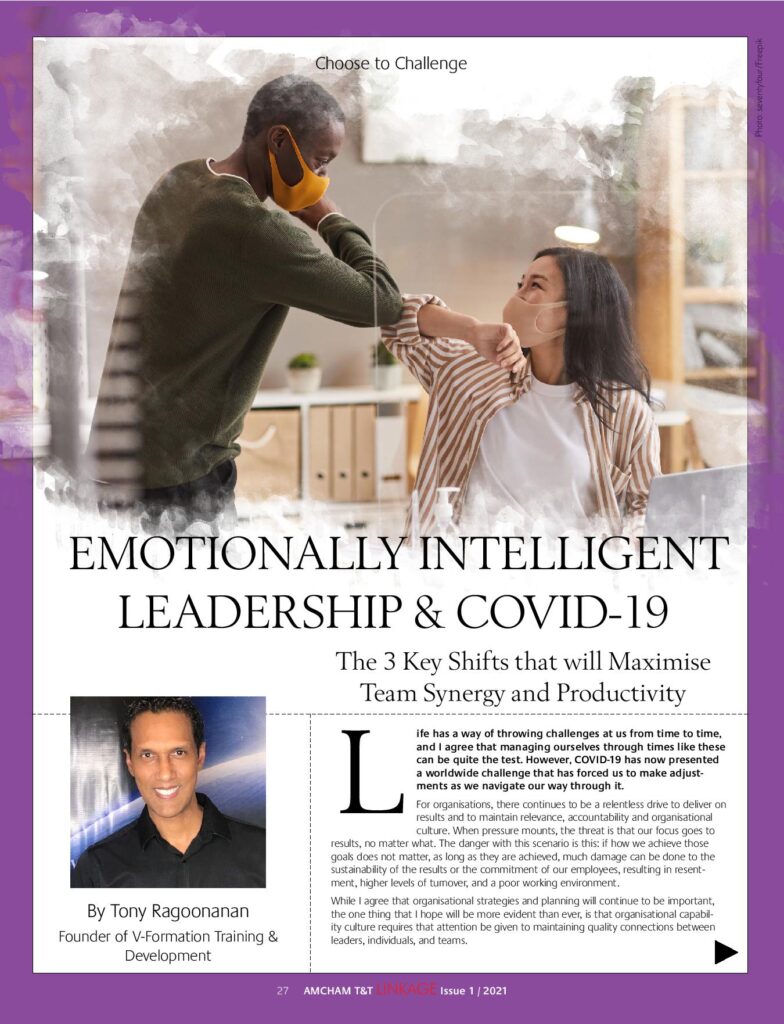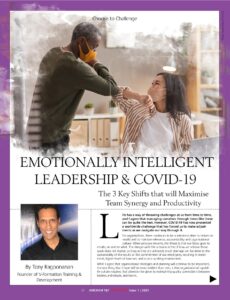
Blog
Emotionally Intelligent Leadership and Covid 19
I am thankful that The American Chamber of Commerce of Trinidad and Tobago (AMCHAM T&T) has featured my article in their NEW Linkage publication: Q1 (2021) – Choose To Challenge. #LinkageMagazine
The article:
“Emotionally Intelligent Leadership and Covid 19”
….will focus on The 3 key shifts that will maximize synergy and productivity.
Read the full article here:
https://amchamtt.com/Linkage-Articles/10469900
In the interest of continuous improvement, I feel these ideas can drive value to those organizations and individuals who are still challenged by the pandemic.
Please feel free to let me know your thoughts!!
FULL ARTICLE BELOW
Life has a way of throwing challenges at us from time to time, and I agree that managing ourselves through times like these can be quite the test. However, Covid-19 has now presented a worldwide challenge that has forced us to make adjustments as we navigate our way through it.
For organizations, there continues to be a relentless drive to deliver results and to maintain relevance, accountability, and organizational culture. When pressure mounts, the threat is that our focus goes to results, no matter what. The danger with this scenario is this: if how we achieve those goals does not matter, as long as they are achieved, much damage can be done to the sustainability of the results or the commitment of our employees, resulting in resentment, higher levels of turnover and a poor working environment.
While I agree that organizational strategies and planning will continue to be important, the one thing that I hope will be more evident than ever is that organizational capability culture requires that attention be given to maintaining quality connections between leaders, individuals, and teams.
“….culture doesn’t exist within walls; it exists within people, so you have to build culture through people, wherever they sit.” – Becky Frankiewicz and Tomas Chamorro-Premuzic -“The Post-Pandemic Rules Of Talent Management” (Harvard Business Review)
The key to this, from a leadership perspective, is rooted in Emotional Intelligence (EI) which is the ability to understand and manage one’s own emotions and having mental and verbal agility to influence others while getting things done.
With this in mind, I want to focus on 3 key shifts that drive Emotionally Intelligent leadership:
- What leaders should DO – Have the Conversations
- How leaders should BE – Be Genuine
- What leaders must CREATE – Create Psychological Safety
1. HAVE THE CONVERSATIONS
One of the major reasons that relationships fall apart in the workplace is when we don’t have conversations. Conversations allow us to share information, express concerns, develop others and give and receive feedback. For some, the fact that these conversations are not actually face-to-face and the verbal and psychological cues are now filtered due to working remotely due to Covid makes it both challenging and necessary. In addition to the quality of these conversations, frequency is another important criterion, especially for those working from home.
These conversations fall into two categories: Individual and Group Conversations.
The Individual Conversations: These include firstly, the immediate conversation about goals and objectives. Have they changed due to Covid? This would depend on the nature of the organization. Nevertheless, a conversation is required so that there is clarity from the employee’s perspective. This helps to drive motivation. A lack of clarity can lead to resistance.
“The enemy of accountability is ambiguity”- Patrick Lencioni, The Five Dysfunctions of a Team: A Leadership Fable
Secondly, the conversation on expectations from the leader’s perspective as well as that of their employees. What are the expected behaviours? What are the priorities? How are we going to deal with collaboration, deadlines, and conflict? Questions must come freely from both sides. These are the immediate conversations that will serve to clear up doubts and to maintain accountability.
Within individual conversations, there are also ongoing conversations and these will include coaching, feedback, performance conversations, conversations on employee well-being and giving feedback to the leader. The fact that we are in a pandemic doesn’t mean that performance management should be put on hold even if we are working from home. These conversations facilitate continuous development, and improved relationships and will serve to drive the alignment of skills, behaviours and goals.
The Group Conversations: The intention of group conversations is to encourage and achieve synergy, which is really about creating a whole that is greater than the sum of its parts. These conversations must involve support for and a focus on the “big picture.” This means having shared business knowledge, a shared vision and sense of direction through planning and organizing, a shared belief in the values that are important to the organization, and a shared feeling of support to make decisions about our life, work and the future, especially as a team. This helps to define the “what” we are going after, its purpose, which is “why” we are going after it, and “how” we will do it.
Together, these conversations help employees to get clarity and to take ownership of what needs to be done. It also helps leaders to develop closer interpersonal relationships and create a more empowering work environment.
2. BE GENUINE
While we have these conversations, it is critical that leaders “show up” in a way that will have the impact it needs to have. Simply having the conversations is valuable but it’s not enough to just go through the motions. In order to demonstrate qualities that are associated with emotional intelligence, you have to be genuine.
Being genuine means that a person is true to themselves in the way that they think, feel, and communicate. It means that they have the ability and confidence to express themselves freely and clearly and includes an element of psychological maturity, meaning that they are also willing to admit their challenges and limitations (vulnerability). It relates to EI, in that, it requires that self-awareness and self-regulation be used to manage oneself and others in a variety of situations. A willingness (motivation) to do this will open the door to the demonstration of both social skills and empathy for others.
“Being flexible with who you are is okay. It is not denying or disrespecting who you are.” – William Fleeson (Professor of Psychology at Wake Forest University)
Being genuine during our conversations lets your employees know your thoughts and perceptions. This is critical because Covid has created a situation where there is, understandably, some level of fear, uncertainty and mistrust among staff. The fact that leaders are more genuine means that they are more adaptable and more empathetic. This is especially helpful during regular conversations, coaching sessions and performance conversations because it creates an environment where an employee will feel more comfortable taking an active part in the conversation.
The flip side of this is that when an employee doesn’t speak up, critical issues may not be addressed and because of this, leaders may think that everything is ok which will, in fact, be inaccurate.
Therefore, don’t pretend to care. Show your intent with your interactions. Employees will know when you are being genuine. For example: Don’t give generic feedback. Be specific with it. Even if negative feedback is given to an employee, it should give the impression that you, as a leader are on their side.
3. CREATE PSYCHOLOGICAL SAFETY
So far, we have explored what leaders should DO and how they should BE. These open the door to where psychological safety becomes possible.
Psychological safety describes a team environment where individuals feel that they can speak up, offer ideas, and ask questions without fear of being judged or ridiculed by their leader or members of their team.
In his book “The Five Dysfunctions of a Team: A Leadership Fable”, Patrick Lencioni talks about the “Absence of Trust” as being the first dysfunction. What creates this is an unwillingness to be vulnerable within the group as a whole, not just with individuals (Remember that this is a part of being genuine). Think of a leader who creates an environment of fear. Would employees feel comfortable expressing their opinions to that leader if they had an issue? The leader may think that all is well, when it is actually the opposite. Without trust, people don’t voice their opinion for fear of creating conflict. There will be a form of artificial harmony. What this eventually leads to (according to Lencioni) is a lack of commitment, avoidance of accountability and inattention to results.
“Low levels of psychological safety can create a culture of silence.”
– Amy C Edmondson
Even though a leader must set the vision and strategy, manage priorities, and communicate clearly, their willingness to express their own limitations will create an environment that will encourage others to do the same (leading by example). Employees will be more willing to speak up on the team because of higher levels of trust and psychological safety. This creates more commitment from the team, higher levels of accountability, and a higher level of focus on what they need to achieve.
One important note is that even though trust may exist between certain individuals, psychological safety involves the entire team. It creates the thinking that we are all in this together.
CONCLUSION
Leadership defines culture, and if leaders want to get the best from their people and maintain the right organizational environment during Covid, it starts with having the right conversations, being genuine, and valuing psychological safety for those on their team. All of these happen simultaneously and having consistency with them is the essence of Emotionally Intelligent leadership. This serves to achieve clarity, inspire, and create a sense of accountability when driving for both synergy and productivity.
 Tony Ragoonanan is the Founder of V-Formation Training & Development. As a Trainer and Performance Management Specialist, he helps individuals and organizations to align emotion, skill, and behaviour with outcomes. Outside of this, it’s all about family, football, and fitness!!
Tony Ragoonanan is the Founder of V-Formation Training & Development. As a Trainer and Performance Management Specialist, he helps individuals and organizations to align emotion, skill, and behaviour with outcomes. Outside of this, it’s all about family, football, and fitness!!
868-681-3492 | tonyr0909@gmail.com




Leave a reply